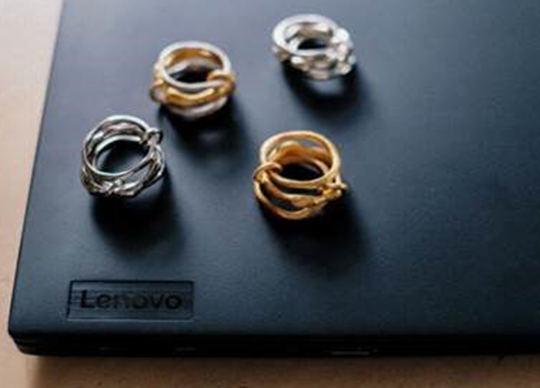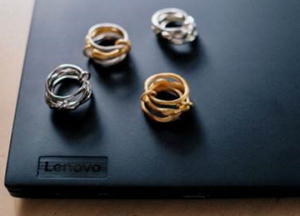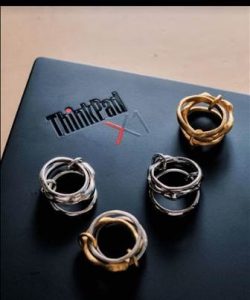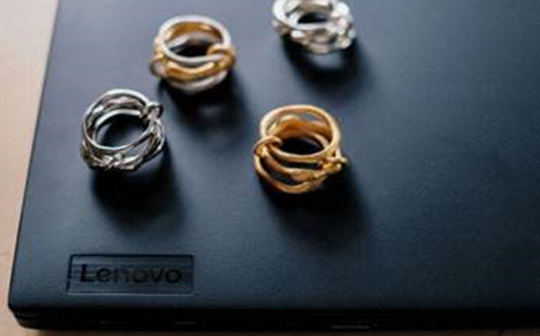

Image: ‘Lenovo Precious Metals’ range of rings.
Lenovo has released findings from a new research report, ‘Rethinking E-waste in a Circular Economy,’ showing that only half (50%) of senior IT business leaders say they are very aware of the potential economic value that resides in their organisations’ electronic waste.
The research shows that despite the majority (75%) of IT business leaders saying their organisation measures and tracks the amount of e-waste they create annually, there is a gap in understanding how to maximise the value in e-waste – for example by selling it to a business to recycle and salvage reusable components and metals. Meanwhile, according to the Global E-waste Monitor, high-value recoverable materials, such as gold, conservatively valued at US $57 billion, are currently being lost to landfill and incinerators.
To bring awareness to the potential value of e-waste and the power of the circular economy, Lenovo today is introducing a collaboration with Holly Ryan, Australian sustainable jeweller and founder of her eponymous label Holly Ryan. Through this initiative, Holly Ryan has created an exclusive range of rings made from metals from recycled e-waste.
‘Lenovo Precious Metals’ is a set of four unique, one-off designer rings created by Holly and made from metals retrieved from e-waste – gold, silver and platinum – breathing new life into old technology.
‘Transitioning to a circular economy has never been more critical for our planet. We must continue finding ways to decouple growth from consumption. At Lenovo, we are committed to lessening our impact on our planet and to reduce, reuse, and recycle wherever possible. One area we’re focused on is e-waste management,’ said Matt Codrington, Managing Director, Lenovo ANZ.
As well as economic value, the ‘Rethinking E-waste in a Circular Economy’ report also found e-waste is a missed opportunity organisations could be capitalising on from a people perspective – almost nine in ten (88%) employees say awareness of their employer’s actions to dispose of end-of-life technology in a sustainable way would make them feel more positive towards their employer.
Key research findings:
- Lack of awareness of business value of e-waste: Only half (50%) of senior IT business leaders said that they are ‘very aware’ of the potential economic value of their organisation’s e-waste, while 39% are only somewhat aware and 9% said they don’t even consider it.
- Disposing of e-waste in a sustainable way to attract and retain talent: Almost nine in 10 (88%) employees say awareness of their employer’s actions to dispose of end-of-life technology in a sustainable way would make them feel more positive towards their employer. Seven in ten (70%) Australian workers agree that knowing that an employer disposes of their old technology in a sustainable way will make them more likely to want to work for them, with 31% strongly agreeing with this sentiment.
- More e-waste action needed: Just four in 10 (39%) senior IT business leaders say their organisation places a high priority on ESG issues. Despite high levels of awareness of IT hardware recycling services (96%), more than one in three (35%) surveyed would not know how to go about using these services (31%) or do not know that they exist (4%).
- Taking a circular approach to e-waste is critical: 59% of senior IT business leaders surveyed reported that their organisation increased the amount of hardware they purchased for staff to use during the COVID-19 pandemic and overall purchases went up by 7.3% on average.

Image: ‘Lenovo Precious Metals’ range of rings.
‘I’m deeply passionate about sustainability and have built my business sourcing recycled metals and stones for my designs, which is why I was so excited to find a partner in Lenovo to create these one-off pieces with. The “Precious Metals” range – symbolic of the power of the circular economy – takes ethical jewellery making to the next level,’ said Holly Ryan.
‘I encourage all companies to be cognisant of what assets they may have within their business that can be recycled or upcycled and to put circular processes in place.’
‘By 2025, Lenovo will have enabled the recycling and reuse of 362 million kilograms of end-of-life products and 76% of PC parts returned to our service centre will be repaired for future use,’ continued Matt Codrington. ‘One way in which we do this is through our Asset Recovery Services, which help businesses get the most out of their end-of-life hardware.
‘Since the beginning of this fiscal year, we have already seen a 43% YoY increase in the number of customers using Lenovo’s Asset Recovery Services. It is fantastic to witness so many of our customers rethinking the lifecycle of technology products, ensuring that every recoverable material from every single device can be reused at end of life,’ concluded Mr Codrington.
Lenovo intends to award the set of four rings to staff who volunteer in the community as a token of recognition and to raise money by auctioning off the rings to support other philanthropic initiatives.






